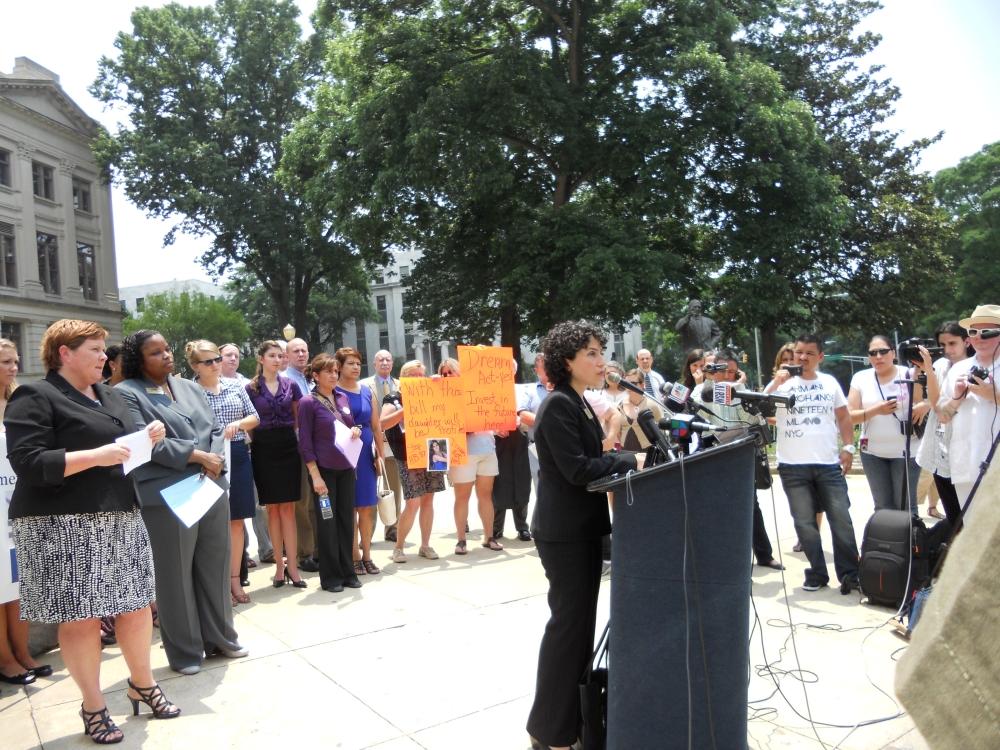
Section Branding
Header Content
ACLU Sues Georgia Over Immigration Law
Primary Content

The American Civil Liberties Union of Georgia filed a class action lawsuit today against the state’s new immigration law. The legal complaint alleges that the statute pre-empts federal law.
The ACLU says the law is unconstitutional because it compels the federal government to act.
Known as HB 87, the law allows the police to check the immigration status of some criminal suspects. If they’re here illegally, the police have to turn them over to federal immigration officials.
Speaking at a press conference at the state Capitol, ACLU’s legal director Chara Jackson says the complaint targets several aspects of the law.
“HB 87 is unconstitutional in that it unlawfully interferes with federal powers and authority over immigration matters in violation of the supremacy clause of the U.S. Constitution," she said. "And it authorizes and requires unreasonable seizures and arrests in violation of the Fourth Amendment.”
The ACLU filed the lawsuit in federal court on behalf of other civil rights groups, and on behalf of individuals who fear they will be targets of the new law.
A federal judge has halted portions of a similar Arizona law, pending constitutional review. When Governor Nathan Deal signed the bill into law last month, he said the statute avoids the pitfalls of the Arizona law.
Deal's spokesman Brian Robinson, says it’s already illegal for immigrants to come here without proper documentation. But the federal government has failed to enforce existing laws.
“We’re looking as Georgians at ways of enforcing current law and promoting the rule of law, which makes everyone play by the same set of rules and makes it fairer for everyone, and makes it fairer for taxpayers who are footing the bill for the huge price tag that comes with illegal immigration in the healthcare, education, and the criminal justice systems,” he said.
Deal, and the bill's sponsor, Rep. Matt Ramsey of Peachtree City, are confident the law will stand up to court scrutiny.
But the law has attracted other attention. That's because it will require businesses with more than 10 employees to use e-verify, a federal citizenship verification system, to determine if a prospective worker can work legally.
Agriculture groups opposed the bill, and now say farmers are seeing labor shortages because migrant workers are afraid they will become the target of the law. Experts have warned the law could also spark a manual labor war with states like Florida that don’t use e-verify.
Charles Hall, head of the Georgia Fruit and Vegetable Growers Association, said last month that if farmers can’t employ large numbers of migrant workers they may stop growing Vidalia onions, peaches, and blueberries -- the state's signature crops.
"If you don't have migrant labor, you can't get your crop in," he said then.
Instead, Hall said farmers could switch to so-called row crops such as cotton and peanuts that machines can harvest.
At the ACLU's press conference, members of churches, labor unions and other groups who help immigrants expressed concern about the provision that targets people who harbor or transport illegal immigrants. The speakers said they fear they will be pulled over while they help illegal immigrants as part of their spiritual, civic or work obligations.
But the law's backers say it's not meant to target church groups. The law defines 'harboring' as providing substantial help to an illegal immigrant but says enforcement will not include anyone who is helping children or victims of crimes; providing social services that are privately-funded; or dispensing medical services or legal representation.
Tags: Nathan Deal, immigration law, HB 87, bonner, ACLU
Bottom Content
